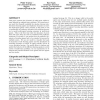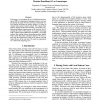ATAL
2008
Springer
14 years 5 months ago
2008
Springer
This paper presents the dynamics of multi-agent reinforcement learning in multiple state problems. We extend previous work that formally modelled the relation between reinforcemen...
ATAL
2008
Springer
14 years 5 months ago
2008
Springer
The problem of coalition formation when agents are uncertain about the types or capabilities of their potential partners is a critical one. In [3] a Bayesian reinforcement learnin...
ATAL
2008
Springer
14 years 5 months ago
2008
Springer
In reinforcement learning, least-squares temporal difference methods (e.g., LSTD and LSPI) are effective, data-efficient techniques for policy evaluation and control with linear v...
ABIALS
2008
Springer
14 years 5 months ago
2008
Springer
Factored Reinforcement Learning (frl) is a new technique to solve Factored Markov Decision Problems (fmdps) when the structure of the problem is not known in advance. Like Anticipa...
ABIALS
2008
Springer
14 years 5 months ago
2008
Springer
Abstract. In order to establish autonomous behavior for technical systems, the well known trade-off between reactive control and deliberative planning has to be considered. Within ...
WSC
2007
14 years 6 months ago
2007
Adaptive Time Warp protocols in the literature are usually based on a pre-defined analytic model of the system, expressed as a closed form function that maps system state to cont...
FLAIRS
2008
14 years 6 months ago
2008
In the paper, we investigate the use of reinforcement learning in CBR for estimating and managing a legacy case base for playing the game of Tetris. Each case corresponds to a loc...
AIIDE
2008
14 years 6 months ago
2008
Human experience with interactive games will be enhanced if the software agents that play the game learn from their failures. Techniques such as reinforcement learning provide one...
AIIDE
2008
14 years 6 months ago
2008
This paper demonstrates the applicability of reinforcement learning for first person shooter bot artificial intelligence. Reinforcement learning is a machine learning technique wh...
GECCO
2010
Springer
14 years 7 months ago
2010
Springer
Shaping functions can be used in multi-task reinforcement learning (RL) to incorporate knowledge from previously experienced tasks to speed up learning on a new task. So far, rese...


